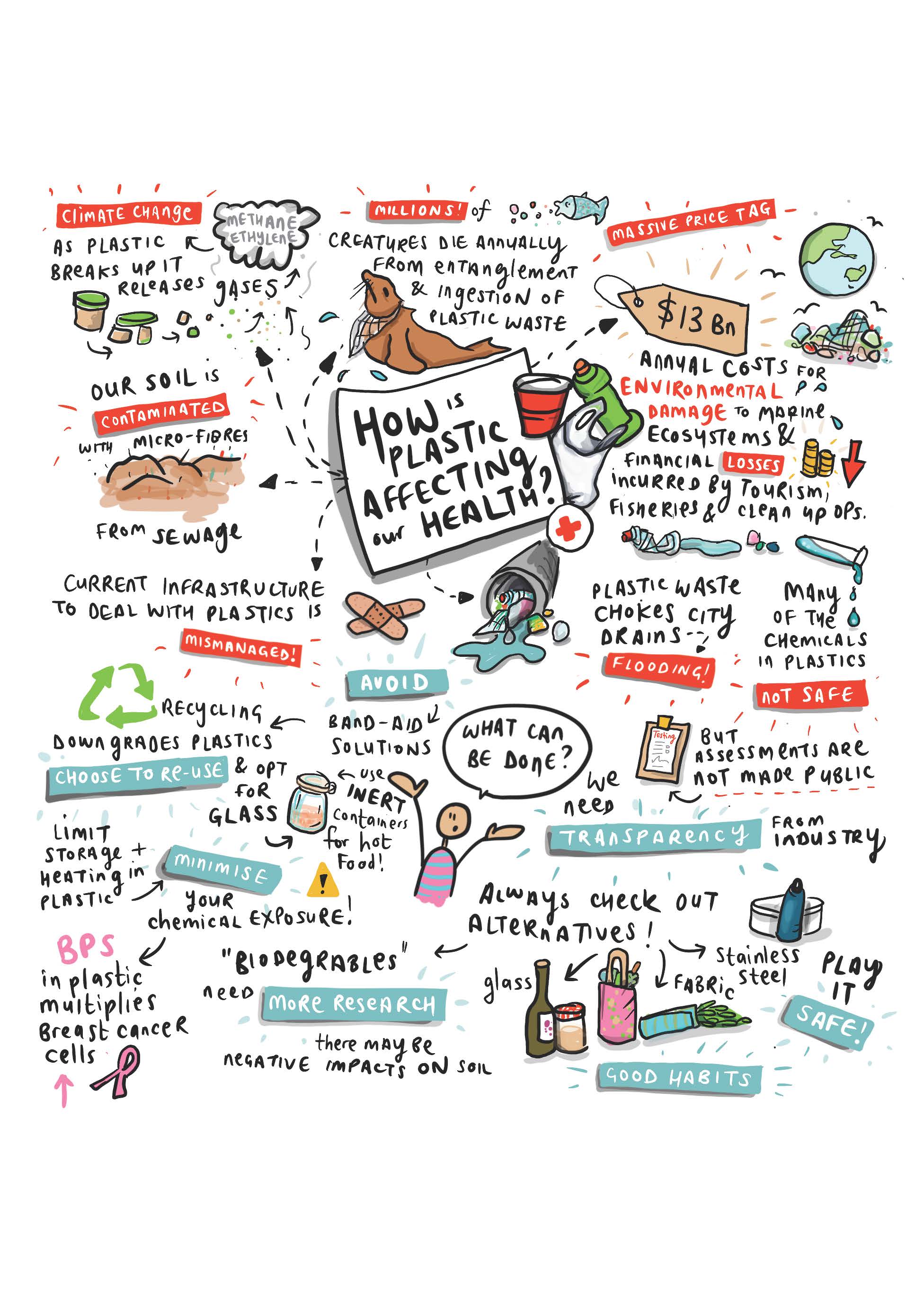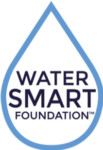Plastic is so integrated into our daily lives that we barely notice it, but when we start to think about it and to examine it closely, the prevalence and pervasive nature of it is alarmingly apparent. More than half of all plastic ever created was produced in the last 15 years, and the scale of production grows every year. As individuals we do have the agency to contribute to either the problem or the solution, and choices made at home have a knock on effect to other aspects of our lives. Nearly all plastic produced today (more than 99 percent) is manufactured from fossil fuels, and conversations about plastic pollution are linked to those about climate change and the effect that human activity is having on the natural world.
Plastic impacts human health in various ways, and at every stage of its lifecycle. We can’t necessarily control the microplastics we breath when we are out and about on the streets of central London, but we can reduce the amount of it at home in day to day life.
Kitchen
Chemicals from plastic migrate into food. The kinds of chemicals and volume varies greatly on the type of food it is, how long it is in the packaging and the different temperature it is exposed to. There can be chemicals like BPAs which have received allot of attention because they used to be used in baby bottles and are now banned for that particular use, however they are still used in food containers and other household items such as laptops and receipts. Phthalates are endocrine disrupters also found in packaging which disrupt delicate hormone balances and can lead to cancers, obesity and reproductive abnormality. So, it is common sense to me, to try not to eat food that comes wrapped in plastic. Simple, right?
Well anyone knows who shops at the local supermarket, its not as easy as that. Here are a few simple things you can do at home to reduce your plastic consumption;
Take your own bags and containers
I am not talking about one cotton bag but preparing properly to not only carry the things you buy and also reduce the need for plastic for loose items as you shop. You may need five to 10 bags of different types depending on the size of the shop. Bring lots of cotton bags for bread. Mesh bags are great for fruit and vegetables, you can wash the veg in them and store them straight in the fridge. I keep paper bags and reuse these, they work for things like pastries and chocolate brownies. Watch a video about bags and containers here
It’s not difficult, just a bit of trial and error to work out how you shop. Then with two minutes of prep you can achieve a zero waste shop and its really satisfying. It’s all about having a system in place and making a habit change. There are some great ideas on Shia’s Wasteland Rebel blog
Filter Your Water
Tap water in London has between 0-10 particles of microplastic per litre. Water bottled in plastic is much higher, up to 100 pieces per litre. If you drink out of plastic bottles, you can consume approx. 150 000 pieces of microplastic per year. Buying mineral water in glass is cumbersome and has a carbon footprint associated with it. The best option is a filter under your sink which remove the microplastics and reduce the need to buy bottled water which contributes to the problem. Then you can take your water bottle with you. To my knowledge, the Pure Ionic Water system is the only one here in the UK that has the technology to remove the microplastic. Find out more here.
I believe we should be able to drink tap water without drinking microplastics, however our water boards are not putting a priority on this. We are pushing for change, watch this space!
Shop at the Farmers Market
Shopping at the farmers market is really great for many reasons – packaging is minimal, it is supporting local farmers, produce is organic, biodynamic, producers are ethical. There is no supply chain as the farmers or their direct employees are the ones serving, food is fresh, local and seasonal. We are not buying Brazillian beef or pineapples flown from Costa Rica.
Find your local farmer’s market in London here
After public pressure, supermarkets are increasing their ranges of produce available package free. You may also be lucky enough to live near a bulk store where you can bring your own containers. Some healthfood stores have bulk sections too.

Rethink Cleaning products
There is a dazzling array of cleaning products available to buy each with a specific purpose, many antibacterial and all packaged in plastic. They have the potential to be crammed in under the sink and fill cupboards. The good news is, we don’t need most, if not any of them. They can be replaced with an all purpose spray made up of a few simple ingredients which can be bought in bulk and come in cardboard. Read the all purpose spray recipe here If you don’t want to make your own, there are some great brands such as Tincture which have reusable packing options and are chemical free.
The Laundry
The apparel industry accounts for 10% of global carbon emissions and remains the second largest industrial polluter, second only to oil. As consumers, we do have the power to influence, to buy less, to not return the items we buy, to shop vintage or from sustainable ethical brands.
Synthetic clothing, polyester and nylon is essentially oil and releases plastic fibres into the water which are then not filtered out and go into our water supply and the ocean. Organically grown, natural fibres are best or tencil and lyocil made from bamboo and eucalyptus. Here is the list of the most environmentally friendly fibres.
It is always best to use what you have, so if you have synthetic garments already, please wash them responsibly. This patented invention is very easy to use and filters out the countless microfilaments of plastic coming from clothing.
To wash, I buy ecover in bulk. It comes in cardboard boxes, is readily available and works well. As I have a toddler and there is food on everything, plus the washable nappies, I use nappysan, it is brilliant and it comes in cardboard. You can also make your own detergent.
When it comes to cleaning products, think refillable, bulk or packaged in cardboard. With every purchase we make, we are supporting business that don’t rely on plastic packaging.
Bathroom
One of the trickiest places to cut down on plastic. Pretty much everything in the personal care genre is packaged in plastic. Before I start on how to replace items, the first step in this process is to ask oneself, ‘do I need this?’. Modern life is full of clutter and the bathroom is no exception. The agenda of cosmetic companies is to provide variety to suit every ‘need’, to make us feel unique and special as consumers. A great exercise is just to use up what you have, then think about what is really missing.
There are non plastic alternatives to creams, cosmetics, and hair care products. These are like what you already have, just in different packaging and usually, they are organic, natural and contain less chemicals than high st and high end alternatives. A company that cares about what is outside it’s product, will generally care about the contents. By buying these products you are supporting ethical businesses and contributing to a higher standard of normal. My latest discovery is a skin balm which smells like oranges and is completely nurturing. The packaging is gorgeous, a little glass pot with a cork lid which I am happy to have out on my bedside table. It was £20 and lasts ages, as far as price points go, it’s pretty reasonable.
I am cutting right down on the products I use and find that many skin and haircare solutions can be found in the kitchen. Natural oils like coconut and olive oil make great cleansers and moisturisers, bicarb and essential oils for deodorant. I am trialling rye flour as shampoo, blog post on this to follow. Rye flour also makes a slightly exfoliating and very kind face and body wash. I have sensitive skin, and it soothes itchiness and maintains the ph 5.5. So it’s a three in one product, and one jar in the shower instead of three plastic bottles. Aside from the reduction of waste, I am loving the minimalism. Rye flour comes in a kilo bag for about £1.50. Another case of less waste being less expensive.
To Conclude
The production, use, and disposal of plastic is interwoven in supply chains that cross and recross borders, continents, and oceans. Plastic pollution is an international problem which requires design thinking, geopolitical cohesion, multi governmental collaboration and many corporations getting involved to solve. As an individual, it is possible to influence change by being aware of what we buy and to reconfigure our identities as consumers. It is a critical time for the planet and there are complex issues facing us, however a few simple changes at home is a really nice place to start.





